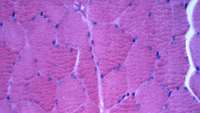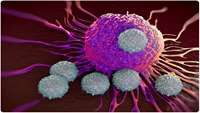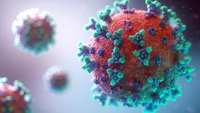Muscle stem cells could retain high regenerative capacity until geriatric age, study reveals
In a recent collaboration, a group of researchers has identified a physiological mechanism in mice that could maintain the regenerative capacity of muscle stem cells until geriatric age.
Blocking energy pathway reduces graft-versus-host disease while retaining anti-cancer effects of T-cells
MUSC Hollings Cancer Center researchers identified that blocking an alternative energy pathway for T-cells after hematopoietic stem cell transplant helps reduce graft-versus-host disease (GVHD) in an animal model of leukemia.
Cell-to-cell fusion approach boosts supply of blood stem cells
A group of researchers has identified a specific protein that is critical for the expansion of blood stem cells. Their discovery, which has been published in Cell Reports, may lead to new methods for growing large quantities of these stem cells, both inside and outside of the human body.
SARS-CoV-2 induces inflammation, cytokine storm and stress in infected lung cells
The researchers Wasco Wruck and Prof. James Adjaye from the Institute of Stem Cell Research and Regenerative Medicine, Medical Faculty of Heinrich-Heine-University Duesseldorf, Germany, employed a bioinformatic approach on transcriptome data pertaining to human lung epithelial cells infected with SARS-CoV-2.
Induced liver regeneration enhances CRISPR/Cas9-mediated gene repair
Use of thyroid hormone to boost hepatocyte proliferation enhanced the efficiency of CRISPR/Cas9-mediated gene correction in the mouse liver. This dietary induction of hepatocyte regeneration may be a viable clinical strategy to enhance gene repair in the liver, according to the peer-reviewed journalHuman Gene Therapy.
Brachyury engineers cardiac repair competent stem cells
To optimize the regenerative proficiency of stem cells, a cardiopoietic protein‐based cocktail consisting of multiple growth factors has been developed and advanced into clinical trials for treatment of ischemic heart failure.
Researchers discover how COVID-19 may trigger fatal levels of lung inflammation
Responding to the COVID-19 pandemic caused by the novel coronavirus, SARS-CoV-2, requires models that can duplicate disease development in humans, identify potential targets and enable drug testing.
Scientists generate, track development of myelin-producing brain cells
Studying human oligodendrocytes, which provide insulation for nerve cells, has been challenging. But a new way of generating stem-cell-derived, three-dimensional brain-cell cultures is paying off. For proper brain function, it's crucial that certain neurons be wrapped with myelin, a coating that enhances impulse transmission.
Wound healing hydrogel activates regenerative immune response
Researchers at Duke University (NC, USA) and the University of California Los Angeles (UCLA; CA, USA) have developed a novel biomaterial that aids the repair of damaged skin through inducing an adaptive and regenerative immune response – whilst reducing scar formation.












